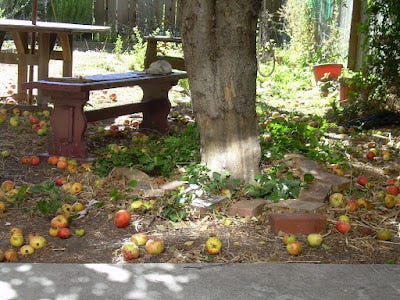(This particular day was in 2011, 14 years ago.)
Early morning in a heavy rain.
Phone call; you're suddenly alert. Nope, the baby, a grandchild, is not coming, not yet. But, after a couple of sick days, another one of your kids needs a ride to school.
Sure.
On the way to my car, I see a woman from behind in a black coat and black tights with a girl, probably 9, in a pink coat and pink tights, hurrying through the rain, no doubt also on their way to school.
As I drive up to and around Bernal Hill, a flood of brown water is flowing south.
Back home, later, the phone rings again. I don't hear it; I'm deep into preparing to deliver a speech tonight on behalf of a program I care about.
When I catch up to the message, it is the third time in three days that one of my kids' schools is calling; this is the third of the three, which means now it's my daughter’s turn to be sick.
Back home, with her wrapped in a comforter and sipping tea, I start wondering what would happen if I actually got a real job?
A friend calls --"It's getting better out there," he says, "I'm seeing more jobs for people like us."
The cellphone company sends an urgent text -- apparently my bill is overdue again, a monthly occurrence. I have a family plan, which includes me, my three youngest kids, and someone I used to know.
It’s funny about euphemisms — they just pop up when you need them.
The rains continue. A tree goes down nearby. I post to my weekly blog about what the tech industry is doing in San Francisco. I put on a white shirt, nice slacks, and a sports coat (I don't wear ties.)
Checking how I look in the mirror, I ask my daughter, who's observing me from her sick bed. "What do you think, jeans or the nice pants?"
"I like those ones (the nice ones)," she says. That's it, a decision is made. She is not only my chief fashion consultant, at the age of twelve she is the main woman in my daily life, the one whose judgment I trust implicitly.
Soon enough it is time to take her back to her Mom's, back over Bernal Hill, where an even bigger brown river now heads south and an even bigger tree nearby has gone down, blocking Folsom Street.
As we are arriving, her brothers show up, home via buses from their high schools, with backpacks and wet sweatshirts.
She hugs me as I drop her off.
"'Good luck with the speech, Dad. You'll be great."
So I drive away, carefully avoiding the mess on Folsom, towards downtown to a hotel ballroom where a room full of adults is gathering. They’ll decide whether what I have to say matters or not.
A song comes on the radio. It's Radiohead: "Creep.”
HEADLINES:
Corporation for Public Broadcasting, funder of NPR and PBS, says it will end operations within months after federal budget cuts (CBS)
Corporation for Public Broadcasting says it's shutting down (NPR)
US employers slash hiring as Trump advances a punishing trade agenda (AP)
Trump says sharper tariffs to take effect in a week but 35% rate for Canada starts immediately (WP)
Trump fires commissioner of labor statistics after weaker-than-expected jobs figures slam markets (CNBC)
This is what dictators do (Gavin Newsom/Twitter)
The labor market is showing big cracks that were invisible just weeks ago (Axios)
The job market is showing signs of weakness as Trump's tariffs take effect (NPR)
How American Power Should Be Deployed (Atlantic)
The EPA Just Issued Its Most Damaging Climate Change Move Ever (Slate)
'Fire clouds' over Arizona and Utah wildfires are creating their own erratic climate (AP)
Federal Reserve governor to resign early, handing Trump an immediate opening on board (WP)
The California Governor’s Race Was in Limbo. Now It’s Wide Open. (NYT)
How the United Nations is funded, and who pays the most (Pew)
As the United Nations lays off staff, can the world still come together to make a difference? (The Conversation)
What humans can learn from some of history’s greatest zoo escapes (WP)
Inside the Summit Where China Pitched Its AI Agenda to the World (Wired)
A.I. Researchers Are Negotiating $250 Million Pay Packages. Just Like N.B.A. Stars. (NYT)
Hundreds Of Years Of Race, Class Privilege Allow Man Extra Legroom (The Onion)


